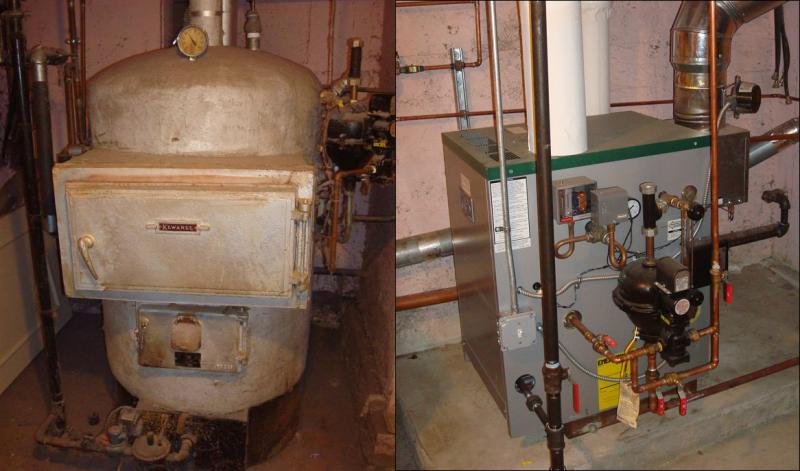Blog Blog
What You Should Know About Replacing Your Boiler
March 16, 2022
What You Should Know About Replacing Your Boiler
March 16, 2022If your home is heated with a boiler, trouble with your boiler can become a big inconvenience. Ignoring issues with your boiler may lead to complete failure and leave you without heat. In this article, we’ll discuss some ways to recognize that your boiler may need to be replaced and how you can make the best investment when replacing it.
Longevity of a Boiler
Most boilers have a lifespan between 15 and 25 years. With proper installation and maintenance, a quality boiler can last toward the higher end of the range. It is important to know when your boiler was installed and keep records of any maintenance work done over the years. If you are purchasing a home with a boiler, have it inspected by a Industrial professional so you can understand the age and condition of the boiler.
When deciding whether to repair or replace the boiler, the age and condition will play a big part in determining what is the better investment. If a boiler is around 15 years old and needs significant repairs, it is likely more beneficial to replace it with a newer, more efficient model.
Signs of Boiler Issues
If your boiler is nearing the end of its lifespan, here are some signs to indicate that it may need to be replaced.
Reduced Efficiency and Higher Operating Costs
If you notice that your boiler isn’t putting out as much heat or is taking longer than usual to heat up, you should have it inspected. Reduced efficiency means the boiler will require more fuel to work properly, and your energy costs will skyrocket. The inefficiency could also be caused by a leak, so it is best to have a professional inspect your boiler right away. It could be safer and more economical to replace the boiler with a newer, more efficient model.
Noises or Odors
If your boiler starts to make unusual clunking or whirring sounds, it is time to have a professional come in for an inspection. Additionally, if you smell any unfamiliar odors coming from your boiler, there may be a potentially dangerous gas leak. Dark marks on the boiler may indicate the presence of carbon monoxide in the air. If you smell an odor or see marks on your boiler, contact a professional immediately.
Rust and Corrosion
One of the biggest indicators that it is time to replace your boiler is visible rust or corrosion on the unit. This usually indicates that there is a larger issue within the boiler, such as a broken valve or leak that is letting air into the system. The moisture reacts to oxygen or minerals in the air and creates rust or corrosion. This causes the metal on the system to thin out and eventually fail and water and steam will begin to leak from the system.
Leaks
If you can see water or condensation on or around the boiler, there is likely a leaking pipe or valve. These leaks are usually an indication of imminent breakdown. Depending on where the boiler is in your home, this could also lead to flooding or other property damage. If you see pooling water, call a professional in for an inspection.
Types of Replacement Boilers
Once it has been determined that your boiler needs to be replaced, you’ll need to consider what type of boiler will work best in your home. There are several options to choose from, but you may be limited by the type of fuel available in your area. You will also need to consider the venting requirements and the ventilation available in your home.
Natural Gas Boiler
Gas boilers must be connected to a natural gas line in order to work. Natural gas is not available in many rural or secluded areas where gas lines have not been run. If you live in a rural area, then propane and oil-powered boilers may be a better option and more accessible.
Electric Boiler
Electric boilers are the most efficient option for homeowners. In addition to being cheaper to install, electric boilers also emit no gas or fumes and have less operating noise. However, they can be more expensive to operate, and you could be left without heat during a power outage.
Steam and Hot Water Boilers
Steam and hot water boilers are not common in newer homes, but they are still on the market. These boilers use a heat exchanger to boil water and then send the pressurized heat through the piping system. Gravity returns cooled water back to the boiler.
Boiler Problems?
Is your boiling making weird sounds or putting off a foul odor? Has your heating bill skyrocketed from an outdated boiler? We have the solution! If you’re considering replacing your boiler or need to have it serviced, contact My Plumber CA today!
Why are we a plumbing industry leader?
The answer to that question is in a million details….and we sweat every one of them. Every mechanic, every member of management and every employee is totally dedicated to this principle.
This is why My Plumber is an unchallenged bench-mark for quality, experience and rock-steady professionalism, in our industry.
Mission Statement
To respond to our clients’ needs, diligently, quickly and honestly, with the highest regard for customer satisfaction.
Vision Statement
‘THE Company of Choice!’
My Plumber CA is committed to being the company of choice for our customer’s Plumbing needs. We strive to exceed the expectations of our customers on every visit.
Also, My Plumber CA continues to value our employees in an effort to make our company the best, inside and out.
Licensees
Licenses CSLB: C36 Plumbing, C20 HVACs, B General Contractor
Lic#: 779636
We Promise
Call before 12 noon, Monday – Friday, and we will be there today, or our labor is free*.
*For priority clients only